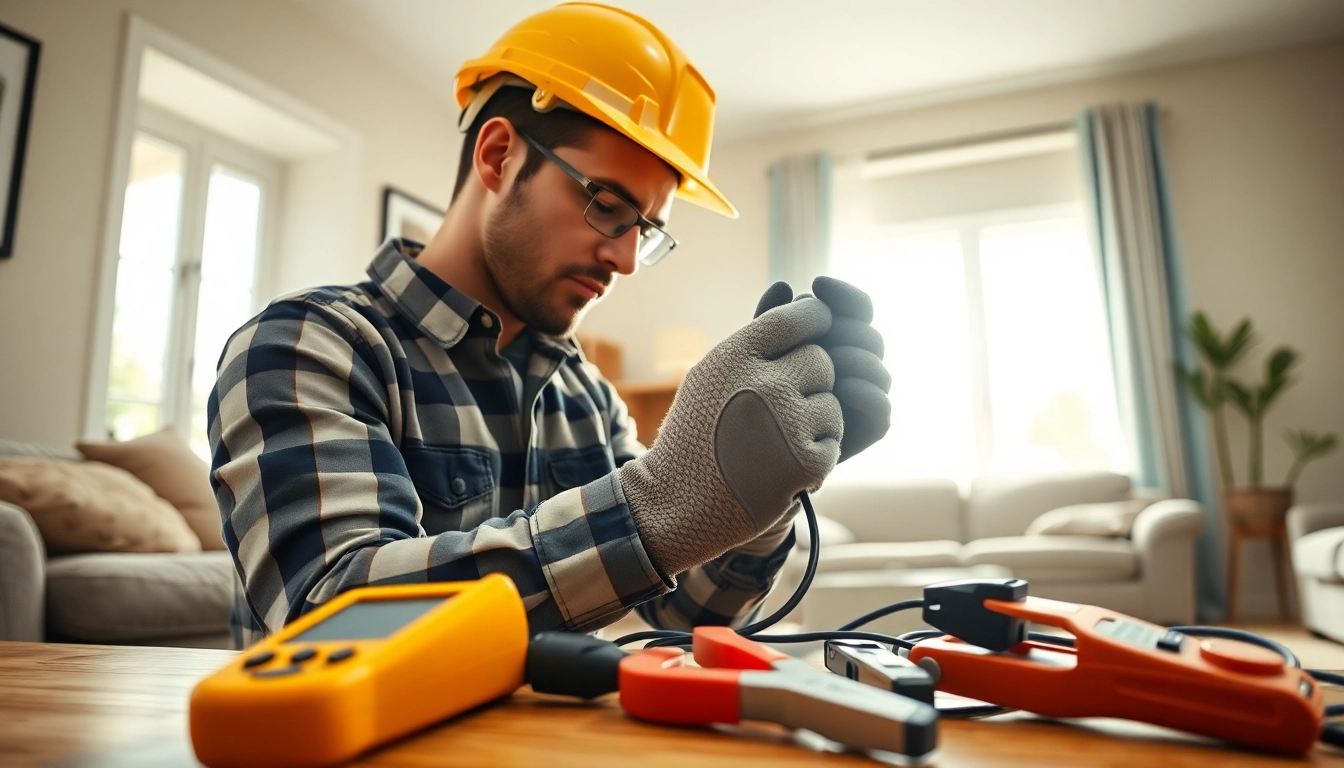Understanding the Role of an Electrician
The role of an Electrician is vital in our increasingly technology-driven world. Their expertise in electrical systems is essential for the installation, maintenance, and repair of electrical systems in residential, commercial, and industrial settings. As we delve deeper into the world of electricians, we will explore their responsibilities, the significance of their work, the services they provide, and much more.
What Does an Electrician Do?
An electrician is a tradesperson who specializes in electrical wiring. Their work encompasses a range of activities, including:
- Installation: Electricians install wiring, electrical fixtures, and equipment as per building codes and safety regulations.
- Maintenance: Regular maintenance tasks involve inspecting and testing electrical systems to ensure they are functioning correctly and safely.
- Repair: They diagnose faults in electrical systems and repair them to ensure that safety and performance standards are maintained.
- Upgrades: Electricians help upgrade existing systems to improve efficiency or incorporate new technologies.
Importance of Electricians in Modern Society
The importance of electricians extends beyond just fixing faulty wiring or installing new outlets. They are pivotal in ensuring that our homes, workplaces, and public spaces are safe and functional. This includes their role in:
- Safety: Properly installed and maintained electrical systems prevent hazards such as fires and electrocutions.
- Energy Efficiency: Electricians implement energy-efficient solutions that contribute to lower utility bills and reduced environmental impact.
- Innovation: They are at the forefront of implementing new technologies, including smart home systems and renewable energy sources like solar and wind.
Common Electrical Services Provided by Electricians
Electricians offer a variety of services tailored to meet individual needs. Common services include:
- Residential Wiring: This involves the complete wiring of new homes, as well as retrofitting older structures.
- Commercial Electrical Services: Electricians often work in commercial settings to install lighting systems, power equipment, and more complex electrical networks.
- Repairs: Many electricians provide services for urgent repairs to minimize downtime and mitigate hazards.
- Outdoor Lighting Installation: They help illuminate outdoor spaces, enhancing aesthetics and security.
Essential Skills for Becoming a Successful Electrician
Success in the field of electrical work requires a solid foundation of skills ranging from technical expertise to interpersonal communication. Here are the essential skills that aspiring electricians should cultivate:
Technical Skills Required for Electricians
Technical skills are paramount to an electrician’s success. They include:
- Wiring and Circuitry Knowledge: Understanding electrical principles and the ability to read blueprints and schematics is crucial.
- Problem-Solving Skills: Electricians must quickly diagnose problems and implement effective solutions.
- Knowledge of Safety Standards: Familiarity with local building codes and safety regulations is essential for compliance and safety.
Soft Skills That Benefit Electricians
In addition to technical skills, electricians should also possess strong soft skills, such as:
- Communication: Effective communication with clients and team members is vital for understanding project requirements and providing updates.
- Attention to Detail: Small oversights can lead to significant safety hazards; thus, meticulousness is necessary.
- Customer Service Skills: Building good relationships with clients can lead to repeat business and referrals.
The Role of Continuous Education for Electricians
The electrical field is constantly evolving with new technologies and regulations. Therefore, continuous education is essential for electricians. This may include:
- Certification Courses: Many electricians pursue additional certifications to stay competitive and informed about new practices.
- Workshops and Seminars: Professional development events can provide insights into industry trends and standards.
- Online Learning: With the rise of online resources, electricians can access a wealth of knowledge and training at their convenience.
Finding the Right Electrician for Your Needs
Choosing the right electrician for your project can seem daunting, but there are steps you can take to ease the process. Here’s how to ensure you select the best professional for your needs:
How to Evaluate Electricians Before Hiring
When evaluating potential electricians, consider the following criteria:
- Experience: Inquire about their years in the industry and the types of projects they have worked on.
- Licensing and Insurance: Always check that the electrician has the required licensing and insurance to perform work in your state.
- References and Reviews: A good electrician will be able to provide you with references from previous clients and have positive reviews online.
Questions to Ask Your Electrician
Engaging the electrician in conversation is crucial for understanding their approach to work. Questions to consider include:
- What is your experience in handling projects similar to mine?
- Can you provide a written estimate and timeline for the project?
- How do you handle permits and inspections?
Understanding Quotes and Estimates from Electricians
When reviewing quotes from electricians, look for clarity and details. A comprehensive estimate should include:
- Labor and material costs
- Payment terms and conditions
- A timeline for project completion
Be wary of prices that seem too low, as they may indicate potential issues or a lack of quality.
Certifications and Licensing for Electricians
In the electrical field, qualifications matter. Licensing and certifications ensure that electricians meet industry standards and are knowledgeable about important safety protocols. Here’s what to know:
Overview of Electrician Certification Programs
Various certification programs aim to help electricians advance their knowledge and skills. Common certifications include:
- Journeyman Electrician: This certification typically requires a combination of education and hands-on experience.
- Master Electrician: The highest level of certification, which necessitates significant experience and proficiency in complex electrical work.
- Specialty Certifications: Electricians can also seek certifications in specific areas like solar technology or low-voltage systems.
Different Licensing Requirements Across States
Licensing requirements for electricians vary widely from state to state. Some common aspects include:
- Examinations: Many states require electricians to pass exams that test their knowledge of electrical codes and safety standards.
- Experience: Candidates often need to complete a specified number of hours as an apprenticeship or under a licensed electrician.
- Renewal and Continuing Education: After receiving their licenses, electricians may need to complete continuing education credits regularly to maintain their status.
Benefits of Hiring Licensed Electricians
Opting for licensed electricians comes with numerous advantages:
- Compliance: Licensed electricians adhere to local and national electrical codes, ensuring safety and legality.
- Quality Work: They are typically subject to rigorous training and assessments, guaranteeing a higher standard of work.
- Insurance Protection: Licensed electricians often have insurance that protects both them and their clients in case of damages or accidents.
Future Trends Shaping the Electrician Industry
As technology advances and society’s needs evolve, the electrician industry is undergoing significant changes. Understanding these trends can help both electricians and clients prepare for the future:
The Impact of Technology on Electricians
Emerging technologies are transforming how electricians work, including:
- Smart Technology Integration: Electricians are increasingly involved in installing smart home devices and energy management systems.
- Advanced Tools and Equipment: New technologies such as drones and augmented reality are influencing surveying and inspection processes.
- Remote Work Capabilities: Software advancements allow for remote monitoring and repair of electrical systems.
Green Technology and Electricians
The growing emphasis on sustainability means electricians will need to adapt to environmentally friendly practices:
- Renewable Energy Installations: Electricians are increasingly installing solar panels and wind turbines, necessitating a new set of skills and knowledge.
- Energy-Efficient Systems: Knowledge of energy-efficient lighting, HVAC, and electrical systems is becoming a standard expectation for electricians.
Career Opportunities for Electricians in Emerging Markets
Demand for skilled electricians is expected to rise in emerging sectors. Potential opportunities include:
- Expansion of Renewable Energy: The transition to clean energy sources will require a large workforce of qualified electricians.
- Urbanization: Rapid urban development creates a demand for both construction and maintenance electricians.
- Technical Specializations: Electricians who specialize in smart technology or energy efficiency solutions are likely to be in higher demand.



